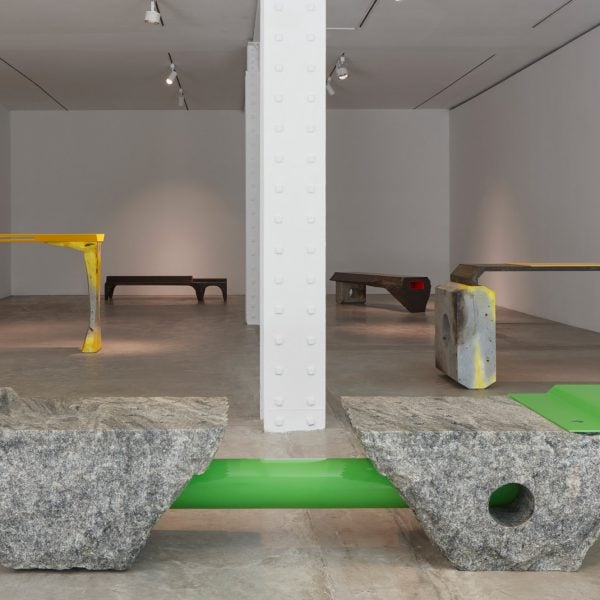[ad_1]
British designer Samuel Ross is exhibiting a series of massive furniture pieces made from stone, metal and wood at Friedman Benda gallery for NYCxDesign, representing his lived experience of the African diaspora in the UK.
The collection, called Coarse, consists of six tables and seats that nod to the visual language of public architecture and play spaces.
The thick stone and concrete elements are a reference to the brutalist housing blocks of Brixton, London, where Ross was born. The designer told Dezeen that the exhibition represents a more personal turn in his practice.
“I’m allowing more of my personal life into the works,” he said. “There shouldn’t be a separation between life and work”.
All of the pieces consist primarily of monotone bases paired with colourful details that carry different meanings. The colours carry emotional and symbolic significance, according to Ross, such as yellow for vigilance and red for the body.
The Slab bench, for example, consists of two large pieces of granite intersected by green-painted steel tubing that was chosen as a nod to childhood.
The tube is also a form common to playgrounds, contrasted with the granite that points towards the materiality of public infrastructure.
“Playgrounds are an early exposure to modernism,” the designer said. “The intensity of green shows a dissonance with the object of what public housing was supposed to achieve.”
Other pieces in the collection were designed to show the tension between “artwork and product”, Ross said. Among them is the Fire Opens Stone bench, which is made of Nero Africa granite, glass fibre reinforced concrete, painted steel and polyurethane.
Ross also coated the concrete base in milk and honey before firing it to form a patina and create a tension between ancient and contemporary materials.
Ross experimented with different methods to work the granite, leaving some of the edges in an almost raw, natural state to contrast the smooth edges and highlight the difference between naturally shaped objects and digital fabrication.
An etched serial code on one side of the bench plays with ideas around mass production, even though the collectible design piece will only be produced in limited numbers.
More natural dyes were used for the Anaesthesia I desk and Anaesthesia II console. Both have primary structures of reinforced concrete and stainless steel, layered with more organic materials like clay and turmeric.
At the entrance to the gallery is Border – a low coffee table made from fired wenge wood, aluminium and powder-coated steel.
The piece was designed to represent “different regions of the Diaspora”, according to Ross, with the metal insets designed to represent “wounds” and the historic conceptions of the “Black body as tool”.
Ross said that while the furniture pieces dive into his own history and the history of Black people in the diaspora, he considers the collection rooted in the present.
“The work I am trying to do is an observation of now,” said Ross. “It’s not just about race. But race is part of it because that’s my experience”.
The exhibition also includes a number of sketches and processual documents for the works, which is a first for Ross.
As well as working across fashion and product design, Ross has completed a number of conceptual exhibitions. In an in-depth interview earlier this year, he told Dezeen that fine art is something he will do “forever”.
The photography is by Timothy Doyon.
Coarse is on view at Friedman Benda from 10 May to 17 June 2023. For more events in New York City during New York design week, which runs from 18 to 25 May, visit our dedicated guide.
[ad_2]

